
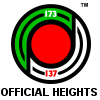 Disability and Wheelchair Darts
Disability and Wheelchair Darts
Besides the major dartboard manufactures there are but a few pioneers in the world of darts. Dart players are always looking for something new that may improve their game; however Australian Russ Strobel has turned his attention to wheelchair users.
In 2010 Russ submitted to the Darts Australia a new recommended dartboard height for Wheelchair users. The height Russ has come up with is 137cm to the centre Bull. The height was based on the perceived origins of the standard hanging height of the standard clock dartboard. It is said the average height of a man in the England UK was 5’8” around 1920’s, the height to the centre bullseye of a standard board. Modern adjustments make that 173cm. Russ has taken this analogy and worked out what the height would be should a man of 5’8” (173cm) be sitting in a wheelchair. His exact figure came out to be 136.5cm however as Russ explains the addition of 0.5cm would make the recommended wheelchair dartboard height easy to remember 137cm (wheelchair) - 173cm (Standard). I agree with you Russ we all like things easy to recall.
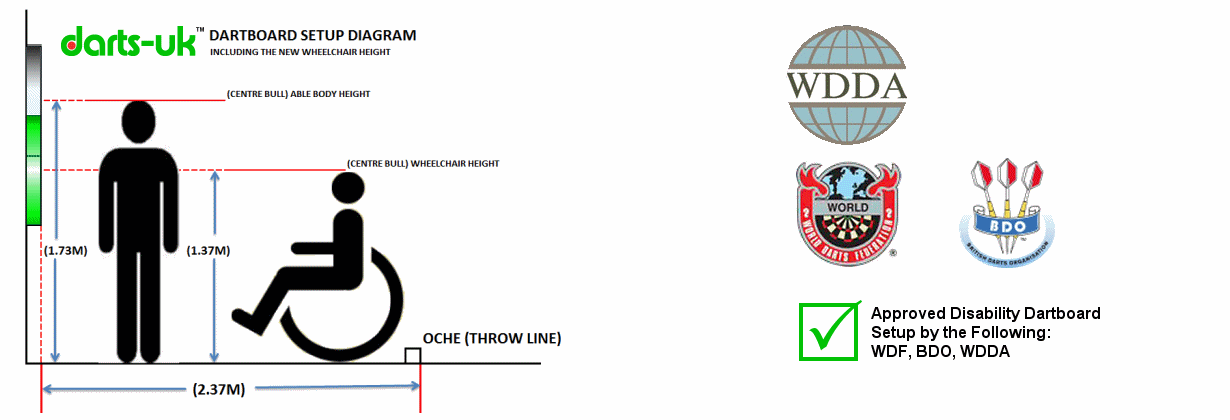
The aim Russ has in mind is for wheelchair users to be able to compete alongside an able body player so Russ has come up with a unique dartboard stand that rotates. A dartboard is mounted on both sides of the rotating panel allowing for quick and easy adjustment between players throws. On one side a dartboard is hung at the conventional height of 173cm and on the other 137cm. This pioneering approach certainly gets Darts501.com’s seal of approval and it also seems dartboard and darts manufacture Puma has recognised the Australian Darts ruling and is now providing the new wheelchair dartboard setup instructions on it’s website. In October 2012 Russ met with the World Darts Federation in Hull (England, UK) regarding approval of the revised dartboard height for wheelchair users. He was delighted to report that after several years of campaigning the lowered board height has been approved by the WDF and will consequently open the sport of darts to players with disability in the now 70 member countries affiliated with the WDF.
Darts has always been the sport you can play across gender and age difference also hasn’t posed a problem nor should disability. To set up a board at a different height should not cause tournament sponsors an issue and I personally believe this can only be good for the sport.
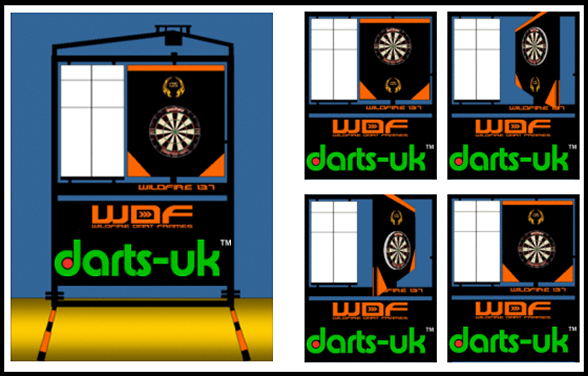
Above is Russ Strobel’s Wildfire 137 Dart Frame.
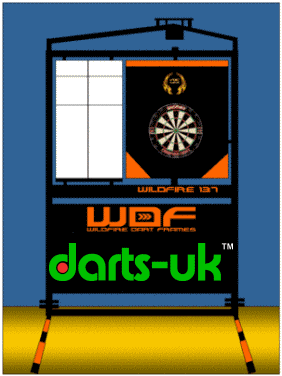
The only additional ruling to wheelchair darts is that both rear wheels of the chair must be behind the oche throwing line. The chair can be horizontal to the board as some players may prefer this.
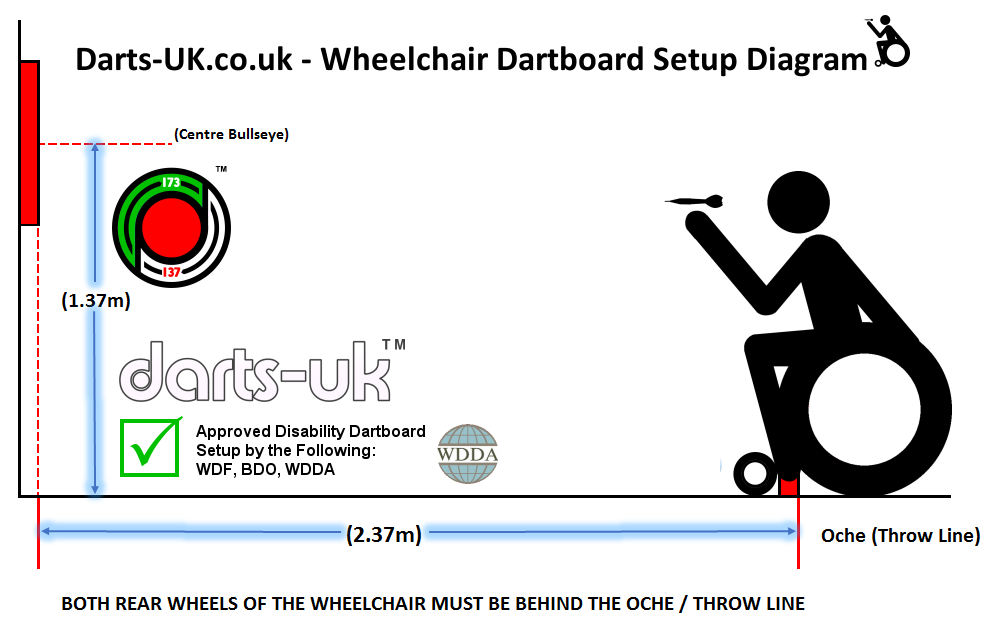
Wheelchair Dartboard Set-up Diagram
Disability Darts Champions

 WDDA Masters 2014 - 2018 / World Championship 2020 -
WDDA Masters 2014 - 2018 / World Championship 2020 -
(WDDA) Masters / World Championship
The Winmau WDDA World Masters (Disability Championship) first event took place in 2014 as a demonstration event following a long campaign to review the dartboard height for wheelchair players. The World Disability Darts Association (WDDA) finally gained approval from the WDF and BDO for the reduce dartboard height for Wheelchair players, 137cm to the centre of the bullseye the rest is now history.
The Disability final is best of 5 legs played on a dual board set-up designed explicitly, so a wheelchair player and a standing player are competing directly against one another.
This event has now been replaced with the WDDA World Championships (Sponsored by Winmau). The WDDA Masters formed part of the sponsored Winmau (BDO) Masters. However, in 2019 the BDO gained a new sponsor for the Master and dartboards used across their events and the disability event was not part of the agenda. Winmau in their wisdom, moved the WDDA Master to the Netherlands and renamed the WDDA masters to the WDDA World Championships. I have kept the event history as one event because the qualifying path is the same.
This event has now been replaced with the WDDA World Championships (Sponsored by Winmau)
2023
My apologies to regular readers as regards the currency of available information, events and results.
I am informed that two major organisations now run the disability darts, the WDDA and ParaDarts.
Despite my best efforts to maintain the historical results for you to see, I am unable to provide further results in this sector of darts. I have tried contacting the disabled darts organisations and the main sponsor of the WDDA World Championships. The sponsor doesn't know the results, so they forwarded my enquiry to the disability darts organisation, and I have received no reply.
The two separate associations, WDDA / ParaDarts, run their own events. It is still unclear to me who belongs to which association or if any belong to both. The original WDDA website has gone, but the revised site hasn't been updated for over a year at the time of publishing this statement. It doesn't feature historical results, but there may be some in-date information for disability players to read.
I have supported disability darts from day one. However, due to the difficulties obtaining information, I will not continue to maintain this section.
The last event records seem like a one-off event. The PDC / WDDA World Matchplay 2022
PDC / WDDA World Matchplay
WDDA World Matchplay Ladies Final
Debbie McBride 2-0 Avril Murphy Patrick
WDDA World Matchplay Classic Final
Paul Hampton 2-1 Davie Patterson
WDDA World Matchplay Compris Final
Jordon Sheppard 2-1 Robert Sutherland
WDDA World Masters 2014 -2018 / World Championships 2020 - Past Champions
The Masters was not played in 2019
| Year | Winner | Legs | Legs | Runner-up | |
| 2020 | Kwanghee Cho | 3 | - | 1 | Mike Callaghan |
| 2018 | Michael Davis | 3 | - | 1 | Ricky Chilton |
| 2017 | Kevin Turner | 3 | - | 1 | Phil Lees |
| 2016 | Vince D'Hondt | 3 | - | 0 | Richard Green |
| 2015 | Vince D'Hondt | 3 | - | 0 | Ricky Chilton |
| 2014 | Ricky Chilton | 3 | - | 2 | Phil Lees |
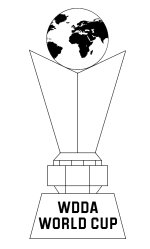
The World Disability Darts Association (WDDA) Winmau World Team Cup
The first World Disability World Cup was played 22-24th February 2019. Teams from several countries took part including England, Wales, Netherlands, Belgium, Ireland, Germany, Russia, South Africa, Denmark plus tow additional groups team Europe and the Rest of the World. England, Germany and Belgium submitted two teams each to compete in the first WDDA World team cup.
Earlier phase is a group round-robin. Four groups of three teams and one of four compete against each other with the two teams progressing to the quarter-final knock-outs.
The quarter-finals through to the finals is a best of 17 legs.
The event also includes two singles categories: Wheelchair and Standing.
WDDA Winmau World Team Cup Champions, Runners-up and Bronze Medallist
| Year | Winner | Legs | - | Legs | Runner-up | Joint third | Joint third |
| 2022 | Belguim (A) | 9 | - | 1 | France | Netherlands | Hungary |
| 2021 | - | - | - | - | - | - | - |
| 2020 | - | - | - | - | - | - | - |
| 2019 | England (A) | 9 | - | 7 | Wales | Netherlands | Belgium |
WDDA Winmau World Singles Cup - Wheelchair
| Year | Winner | Legs | Legs | Runner-up | |
| 2022 | Vincent D'Hondt | 4 | - | 1 | Ricky Chilton |
| 2021 | - | - | - | - | - |
| 2020 | - | - | - | - | - |
| 2019 | Vincent D'Hondt | 4 | - | 1 | Ricky Chilton |
WDDA Winmau World Singles Cup - LadiesWheelchair
| Year | Winner | Legs | Legs | Runner-up | |
| 2022 | Chole Francq | 2 | - | 1 | Chanine Vriezen |
WDDA Winmau World Singles Cup - Standing
| Year | Winner | Legs | Legs | Runner-up | |
| 2022 | Evi Foulon | 4 | - | 1 | Paul Gelder |
| 2021 | - | - | - | - | - |
| 2020 | - | - | - | - | - |
| 2019 | Pete Bramley | 3 | - | 0 | Jackie Goethals |
WDDA Winmau World Singles Cup - Ladies Standing
| Year | Winner | Legs | Legs | Runner-up | |
| 2022 | Gabby Wehrt | 3 | - | 1 | Bianka Stauch |
Pairs events also took place at the World Trophy Not recorded here.
BDDA and World Para Darts Events 2024
20th-21st January 2024- Wales
Abergavenny Classic and Open 2024
Both are BDDA ranking tournaments.
Held at Abergavenny Labour Hall and Institute, 110 Park Crescent, Abergavenny NP7 5TN
For more information: See BDDA Website
7th-11th March 2024 - Isle of Man
BDDA Isles of Man Classic and Open 2024
Both Tournaments to be World Para Darts and BDDA ranking events.
Held at Douglas, Isle of Man, as part of the Isle of Man Darts Festival
For more information: See BDDA Website
19th-21st April 2024- England
BDDA Winmau Classic and Open 2024
Both Tournaments to be World Para Darts and BDDA ranking events.
at St Helens Darts Academy, Sidac Sports and Social Club, Wheatsheaf Avenue, Sutton Leach, St Helens, Merseyside, WA9 4PJ.
For more information: See BDDA Website
9th-13th May 2024-Wales
BDDA Welsh Classic and Open 2024
Both Tournaments to be World Para Darts and BDDA ranking events.
Held at the Pontins Red Dragon Classic and Open in Pontins, Prestatyn, UK, Hosted by The Welsh Darts Organisation.
For more information: See BDDA Website
5th-6th July 2024- England
BDDA Essex Classic and Open 2024
Both Tournaments to be World ParaDarts and BDDA ranking events.
Held at Chelmsford Social Club, 55 Springfield Road, Chelmsford, Essex, CM2 6JG
For more information: See BDDA Website
The above details are correct at the time of publication. However, Darts-UK.co.uk nor its owner accept no liability should the details change or the event be cancelled. To ensure you have the latest information, please get in touch with the tournament organisers.
 WDDA International Tournaments
WDDA International Tournaments
The WDDA is growing at a fast rate, and new affiliated Countries are joining all the time. This means there will be more tournaments for disabled players to compete in around the World. For current information and tournament details in the Country, you may reside contact the WDDA.
Impairment Classification and Eligibility for WDDA UK Tournaments
Details below show the ‘Impairment Classification and Eligibility for WDDA UK Tournaments’. Impairment classification for darts events is still in its early stages, but some things remain constant regardless of sport when considering the criteria set out by International Paralympic Guidelines. As darts has not yet been included amongst the sports held the Classification detail below is likely to change.
The currency of this information is June 2015. I will update the detail as and when I am informed.
Further information can be obtained from the WDDA Official Website
Impairment Classification and Eligibility for WDDA UK Tournaments - Detail

Impairment Classification and Eligibility for WDDA UK Tournaments
Impairment classification for darts events is still in its early stages, but some things remain constant regardless of sport when considering the criteria set out by International Paralympic Guidelines. As darts has not yet been included amongst the sports held we can only ask their assistance to guide us along a parallel pathway of classification that would not require too many adjustments at the time darts is included.
What is Classification:
Classification provides a structure for competition. Athletes competing in Paralympic sports have an impairment that leads to a competitive disadvantage in sport. Consequently, a system has to be put in place to minimize the impact of impairments on sport performance and to ensure the success of an athlete is determined by skill, fitness, power, endurance, tactical ability and mental focus. This system is called classification.
Classification is sport-specific because an impairment affects the ability to perform in different sports to a different extent. As a consequence, an athlete may meet the criteria in one sport, but may not meet the criteria in another sport. Each sport’s governing body uses the IPC's Eligible Impairment Types and applies them to their sport.
If an athlete is not eligible to compete in a sport, this does not question the presence of a genuine impairment. It means:
• that the athlete does not have a primary impairment that makes him/her eligible to compete in that particular sport, or
• that the severity of the impairment does not significantly impact on the activities required in that particular sport.
We will be using the following six groups which relate to the eight physical IPC eligible impairments classification as used in the closest IPC sport to darts being Archery:
1. Limb Loss or Deficiency
Total or partial absence of bones or joints of the arms, legs of pelvic region as a result of trauma or illness or congenital limb deficiency (e.g. dysmelia). Classes are generally assigned to the athlete according to the number of limbs affected and the location in relation to major joints, (e.g. below elbow).
Minimal Disability Generally, the amputation must be at least through the ankle or wrist.
2. Muscle Weakness
Spinal cord damage as result of injury or a congenital condition such as spina bifida, polio, transverse myelitis, sacral agenesis, spinal tumours, nerve damage, Erbs Palsy, Muscular dystrophies or other conditions that causes loss of muscle strength or paralysis in the trunk and legs (paraplegia) or legs, trunk and arms (quadriplegia) Classes are generally assigned based on where the injury has occurred in the spine and how this affects body movement.
Minimal Disability (Australian Paralympic Committee) Generally, the muscle weakness in the legs, trunk, and / or arms, is tested using a 5 point scale. Athletes generally must lose at least 15 - 20 points to be eligible for a Paralympic Sport.
3. Hypertonis, Ataxia, Athetosis or Dystonia
This group encompasses those who have cerebral palsy or an acquired brain injury, stroke, brain tumour, multiple sclerosis, Cerebellar ataxia, hereditary spastic paraparesis or condition in which muscle tone, balance or movement co-ordination are affected. This includes conditions such as hypertonia (quadriplegia, diplegia, and hemiplegia), dystonia, athetosis and ataxia. Classes are sport specific and are assigned according to the impact on movement, balance and co-ordination and which areas of the body are affected most significantly. Minimal Disability (Australian Paralympic Committee) Generally the impact must be measurable in at least one joint in the arm or leg.
4. Short Stature
This group encompasses conditions such as Achondroplasia, Spondoepiphysealdyplasia or similar conditions that impact on an athlete’s adult height. Minimal Disability The height for athletes with short stature is a maximum of 145cm.
5. Impaired Passive Range of Movements
Conditions which cause the range of movement in one or more joints is reduced in a systematic way for example due to Arthrogryposis, Talipes Equinovarus. However hypermobility of joints, joint instability and acute conditions reduced range of movement which as arthritis are not considered eligible impairments.
Minimal Disability As a guide the full fusion of one ankle or wrist is the minimum.
6. Leg-length Difference
The group encompasses conditions such as Dysmelia or other conditions causing significant bone shortening in one leg Minimal Disability As a guide a length difference of 7cm is considered
Assimilation into darts
Players from the above six categories will/may need to be assessed to allow inclusion within one of the following three classifications:
ST - Standing player W1 - Wheelchair player with limited mobility in legs, trunk and arms W2 - Wheelchair player with limited mobility in legs and trunk
Level of Sport Proficiency
Where a player is new to the sport of darts a Level of Sport Proficiency (LOSP) will be set as the minimum level of skill required. This will ensure safety to those scoring and those using nearby dart boards. The attainment of the LOSP is determined by the tournament organisers
Assessment will be based on three areas:
Accuracy:
For a player to enter competition a demonstration of their ability to consistently hit the playing surface of the dart board is required. Ten (10) sets of three (3) darts will be thrown during the assessment. After each set, retrieval by the thrower will be made and commencement of throwing the next set of darts within 90 seconds. Any darts that do not meet the surface of the dart board must not land outside the area defined as the “backboard”. No more than three (3) darts hitting the backboard in the assessment is permissible.
Darts that fall short of the board will be classed as falling outside the defined “backboard” area unless they hit the dartboard or backboard before dropping to the floor.
In summary:
To attain the required LOSP in Accuracy no more than 3 darts may miss the playing surface of the dart board. All darts that miss the dart board must hit the area defined as the backboard and not outside this area.
Dart Retrieval:
Retrieval of darts can cause fatigue and inaccuracy of throw as games progress. It is therefore important to assess the capabilities of the thrower to retrieve their own darts for the length of a match. WDDA hosted events will allow the use of a retriever of darts where required but this may not be the case in mainstream darts events where a player is expected to retrieve their own darts at all times. Retrieval assessment is carried out in conjunction with the LOSP for Accuracy. Using the time frame and number of darts thrown, determination will be made as to the need for an appointed “darts retriever”. Where poor accuracy appears to be caused by fatigue the thrower may opt for reassessment after a reasonable period of recovery using a dart retriever. If assessed as attaining the required LOSP in Accuracy with the assistance of a dart retriever the thrower will be required to use a dart retriever for the duration of the event - for all games played. Re-assessment must be undertaken prior to future events before any change to the conditions of play for that play-er can be made.
Etiquette:
LOSP in the sport of darts requires that sporting etiquette be observed at all times. This is not something that relates specifically to any particular disability but relates to all players. Willingness to adhere to, and understanding of the appropriate level of behaviour during any darts activity is considered paramount, not only by the WDDA but all darting organisations. Events hosted by the WDDA do however bring together a range of disabilities including intellectual disability in the one venue which may increase the possibility of anti-social behaviour even if unintended. In assessing the LOSP for darts it is important to consider the following:
The type of disability The level of care in attendance at the event The degree of aggression associated with any lack of etiquette.
Where any lack of etiquette is likely, and a commitment by the carer is not forthcoming to be in close attendance at all times, the WDDA cannot accept that player’s entry into an event and therefore are considered to have failed the LOSP assessment regardless of the result in Accuracy and Retrieval.
Attainment of LOSP in all three (3) Categories is required to enter a WDDA darts event. Attaining an LOSP in Etiquette is required for entry into WDDA Satellite events.
Safety during assessment will not be compromised in any way or at any time. Where Accuracy assessments are taking place no person (including the Assessor) will be in front of the thrower. Nobody other than the Assessor may within 4 meters of the assessment area.
The appropriate WDDA Assessment Sheet will be completed and signed by the Assessor and person being assessed upon completion and submitted to WDDA Officials prior to the event.
The process of LOSP is a crucial to the safety, smooth running and integrity of WDDA events. WDDA LOSP Assessment results may be made available to other darts organisations where requested at the discretion of WDDA Board of Administrators.
Further information regarding Disability darts can be found from the WDDA
UK Contacts
British: British Disability Darts Association
Scotland: Disability Darts Scotland
Northern Ireland: Disability Darts ( sorry no link given) contact details
Wales: Disability Darts Wales (Facebook)